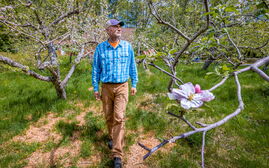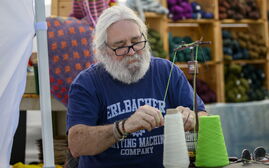
Processing Your Payment
Please do not leave this page until complete. This can take a few moments.
- News
-
Editions
View Digital Editions
Biweekly Issues
- November 17,2025
- November 03, 2025
- October 20, 2025
- October 6, 2025
- September 22, 2025
- September 8, 2025
- + More
Special Editions
- Lists
- Viewpoints
-
Our Events
Event Info
Award Honorees
- Calendar
- Biz Marketplace
2021 focus for Maine's organic farmers, food producers is on sustainability, climate
 Courtesy / MOFGA
The Maine Organic Farmers and Gardeners Assocation hopes the Common Ground Country Fair, held the third weekend of September in Unity, will be back to a physical event this year.
Courtesy / MOFGA
The Maine Organic Farmers and Gardeners Assocation hopes the Common Ground Country Fair, held the third weekend of September in Unity, will be back to a physical event this year.
Maine's organic farmers and food producers were hit hard by the pandemic in 2020, as well as months-long drought, and the focus of the Maine Organic Farmers and Gardeners Association in the new year is on making the state's food system more resilient.
While the short-term focus is recovery, the long-term one is how to adapt and sustain the state's food industry in the face of climate change, Sarah Alexander, MOFGA director, told Mainebiz.
The organization, which has about 500 members, will discuss programs and public advocacy related to that focus, as well as the effects of 2020, at its annual meeting, to be held online Thursday, Jan. 14. The meeting is free and open to the public.
"We have the most incredibly resilient farmers in Maine," Alexander said.

"We are truly lucky to live in a place that values our farmers, and values the work of groups like ours that support farmers at every level, from beginners to those thinking about retirement," she said.
The pandemic was a shock to the state's food system in general, she said. "There were bare shelves in grocery stores, and farmers lost their restaurant and institutional markets overnight," she said. While many small farmers were able to adapt quickly and pivot to direct to consumer sales to replace lost markets, particularly the restaurant industry. Many had strong years with the increased demand for local food. But others couldn't do it.
"Unfortunately, if farms weren't able to make those adaptations, or they were operating at a scale too large to allow for such shifts, they may have had a pretty tough year," she said. "Federal and state programs have helped, but we must work to improve our food system so that food produced in Maine can get to more people in Maine and beyond."
MOFGA also partnered with the Maine Farmland Trust to provide $188,960 in grants to 79 Maine farms, in addition to CARES Act funding and other pandemic relief support farms got.
With the pandemic and drought in mind, but also climate change, which has been a MOFGA focus for several years, 2021 will be about sustainably increasing food production while mitigating the effects of climate change.
"We have an opportunity to increase the food that we're producing in Maine to support both our local communities and regional consumer demands," Alexander said.
Organic farming poised to adapt
Organic farming is particularly poised to make the shift. "When we grow more food, we also have the ability to address climate change by growing organically and tending to the soil health," she said. "Organic production practices, which don't use synthetic pesticides or fertilizers, can help sequester more carbon in the soil, which can help mitigate greenhouse gas emissions."
She said that a focus on healthy soil also allows farmers can mitigate the increasing extremes brought on by climate change, from drought to massive rainfall. "Healthy soil can act as a sponge to absorb moisture quickly, and hold it for longer," Alexander said.
"In the coming years we also need to focus on investing in our food processing infrastructure," she said. "Just like no fish should leave Maine with it's head on, we need more food to leave Maine as a value added product."
Common Ground Country Fair pivot
Another blow to Maine farmers was the all-virtual Common Ground Fair this year, which consistently attracts about 60,000 visitors over three days to the fairground in Unity, in Waldo County.
It's their biggest money-maker of the year for many of the vendors and exhibitors. The 2020 fair was held online, and the fair marketplace has continued through the months into January. MOFGA also opened a pop-up store in Freeport to allow vendors to make up some of their losses, which is remaining open into mid-January.
In 2018, the last year for which numbers are available, the fair grossed $674,500. It had 790 workshops and classes, 670 exhibitors and 90 social and environmental organizations. The Common Kitchen at the fair served more than 5,500 meals.
"Never in our wildest dreams did we imagine that the Common Ground Country Fair would be an online event," she said. MOFGA made the call to go online early, in May, to give exhibitors and presenters time to decide if they wanted to take part and how to do it.
"Even though we would have preferred the in-person fair, we're really proud of the three days of livestreaming content, the educational video library and the online marketplace we created for the online fair," she said. Not only is the online marketplace still available, but all the fair's content, including workshops and videos, is available online."
Despite the success, she said MOFGA hopes it can hold a physical fair this year. "We'll monitor things closely and make a decision before the summer, so again we can make alternative plans if we need to," she said.
Mainebiz web partners
Related Content

The Giving Guide
The Giving Guide helps nonprofits have the opportunity to showcase and differentiate their organizations so that businesses better understand how they can contribute to a nonprofit’s mission and work.
Learn More
Work for ME
Work for ME is a workforce development tool to help Maine’s employers target Maine’s emerging workforce. Work for ME highlights each industry, its impact on Maine’s economy, the jobs available to entry-level workers, the training and education needed to get a career started.
Learn More
Groundbreaking Maine
Whether you’re a developer, financer, architect, or industry enthusiast, Groundbreaking Maine is crafted to be your go-to source for valuable insights in Maine’s real estate and construction community.
Learn more-
The Giving Guide
The Giving Guide helps nonprofits have the opportunity to showcase and differentiate their organizations so that businesses better understand how they can contribute to a nonprofit’s mission and work.
-
Work for ME
Work for ME is a workforce development tool to help Maine’s employers target Maine’s emerging workforce. Work for ME highlights each industry, its impact on Maine’s economy, the jobs available to entry-level workers, the training and education needed to get a career started.
-
Groundbreaking Maine
Whether you’re a developer, financer, architect, or industry enthusiast, Groundbreaking Maine is crafted to be your go-to source for valuable insights in Maine’s real estate and construction community.
ABOUT
NEW ENGLAND BUSINESS MEDIA SITES
No articles left
Get access now
In order to use this feature, we need some information from you. You can also login or register for a free account.
By clicking submit you are agreeing to our cookie usage and Privacy Policy
Already have an account? Login
Already have an account? Login
Want to create an account? Register
Get access now
In order to use this feature, we need some information from you. You can also login or register for a free account.
By clicking submit you are agreeing to our cookie usage and Privacy Policy
Already have an account? Login
Already have an account? Login
Want to create an account? Register











0 Comments